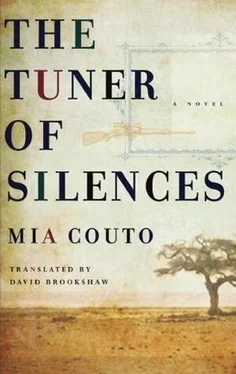And I saw how Ntunzi raised his arms in a “v” for victory, savouring his moment like a bird setting off skywards. He stayed for a time swaying backwards and forwards, deciding which way to go. As if he were teetering on the edge of a cliff. He danced around on the tips of his toes, as if he were expecting to take a plunge rather than a step forward. I wondered: why was he taking so long to set off? And then I had my doubts: could it be that he wanted that instant to last forever? Was he indulging himself in the joy of having a door, and being able to close it behind him?
But then something happened: instead of moving forward as he had intended, my brother doubled up as if he had been hit by some invisible blow behind the knees. He fell on his hands and lay down in the posture of a wild animal. He dragged himself over the ground in circles, snuffling amongst the dust.
I quickly vaulted over the fence to help. And it pained me to see him: Ntunzi was stuck to the ground and in tears.
— Bastard! You great son-of-a-bitch!
— What’s wrong, brother!? Come on, get up .
— I can’t. I can’t .
I tried to lift him. But he weighed as much as a sack of stones. We still managed to stagger along, shoulder to shoulder, dragging ourselves as if we were wading against the current of a river.
— I’ll call for help!
— What help?
— I’ll try and find Uncle .
— Are you crazy? Go back home and bring the wheelbarrow. I’ll wait here .
Fear dilates distances. Under my feet, the miles seemed to multiply. I reached the camp and brought the little handcart. This was the barrow in which my brother would be transported back home. Spilling over the cart on either side his legs swayed, hollow and lifeless like those of a dead spider, all the way home. Defeated, Ntunzi whimpered:
— I know what it is. . It’s bewitchment. .
It was indeed bewitchment. But not a jinx put on him by my father. It was the worst of all spells: the one we cast on our own selves.

My brother fell ill again after his frustrated attempt at escape. He shut himself away in his room, curled up in bed and pulled the blanket up to cover himself completely. He stayed like that for days, his head hidden under the cover. We knew he was alive because we saw him shaking, as if he was having convulsions.
Little by little, he lost weight, his bones pricking his skin. Once again, my father began to get worried:
— Now son, what’s the matter?
Ntunzi answered so quietly and peacefully that even I was surprised:
— I’m tired, Father .
— Tired of what? If you don’t do anything from morning till night?
— Not living is what I find most tiring .
It gradually became clear: Ntunzi was going on strike over existing. More serious than any illness was this total abdication of his. That afternoon, my father lingered by his first-born’s bed. He pulled back the blanket and examined the rest of his body. Ntunzi was sweating so profusely that his sheet was soaked and dripping.
— Son?
— Yes, Father .
— Do you remember how I used to tell you to make up stories? Well, make one up now .
— I haven’t got the strength .
— Try .
— Worse than not knowing how to tell stories, Father, is not having anyone to tell them to .
— I’ll listen to your story .
— You were once a good teller of stories, Father. Now, you’re a story badly told .
I swallowed awkwardly. Although low in tone, Ntunzi’s voice was firm. And above all, it had the assurance of the finality of things. My father didn’t react. He hung his head and sank into himself as if he too had given up. One of us might be dying and it was his fault. Old Silvestre got up, turned and walked round and round the room until Ntunzi’s whisper once again made itself heard:
— Brother Mwana, do me a favour. . Go to the back wall and scratch another star in it .
I set off, aware that my father was following me. I made for the ruins of the old refectory and stopped only when I came to the huge wall that still preserved the black, scorched colour from when it had been set on fire. With a little stone, I drew a star on this big old wall. I heard my father’s voice behind me:
— What the devil is this?
The darkened wall was covered with thousands of tiny stars that Ntunzi had scratched every day, like the work of a prisoner on the walls of his cell.
— This is Ntunzi’s sky, each star represents a day .
I can’t be sure, but my father’s eyes seemed to fill with unexpected tears. Could it be that a dike had burst deep within him, and the grief of past ages that he had managed to contain for years was now bubbling up? I’ll never be sure. For a moment later, he seized a spade and began to scrape the wall with it. Its metal blade re-emphasized the blackened layer upon which Ntunzi had recorded the passage of time. Silvestre Vitalício took his time over this labour of destruction. By the time he had finished, the surface was covered with a darkened squares, while he, exhausted, went back the way he had come like some black, scaly reptile.
Someone says:
“There were roses here in the old days”
And so the hours
Melt away indifferently
As if time were made of delays.
Sophia de Mello Breyner Andresen
When he drove us to the camp eight years ago, the ex-Orlando Macara didn’t believe that his brother-in-law, the future Silvestre, would remain so true to his decision to emigrate from his own life for good. Nor did he suspect that his name would be changed to Uncle Aproximado. Perhaps he preferred the form of address his nephews used for him previously: Uncle Godmother. None of this crossed our uncle’s mind when he brought us to the reserve. It was late in the afternoon when Aproximado climbed down from the truck, and pointing at the wide expanse of bush, said:
— This is your new home.
— What home? — my brother asked, as his gaze swept across the untamed landscape.
My father, who was still sitting in the truck, corrected him:
— Not our home. This is our country.
In the beginning, Uncle even lived with us. He stayed for a number of weeks. Aproximado was a former game warden who had lost his job because of the war. Now that there wasn’t even any world left, he had time to spend wherever he liked. For this reason, during the time he stayed with us, he put his hand to building and re-building the dwellings, repairing doors, windows and ceilings, bringing in sheets of corrugated iron and cutting down the vegetation around the camp. The savannah loves to gobble up houses and make castles unfit for human habitation. The earth’s great mouth had already devoured some of the houses and deep cracks had opened up in walls like scars. Dozens of snakes had to be killed inside and in the vicinity of the ruined houses. The only building that wasn’t rehabilitated was the administration block in the centre of the camp. This residence — which we came to call the “big house” — was cursed. It was said that the last Portuguese administrator of the reserve had been killed there. He had died inside the building and his bones must still be lying there among the rotting furniture.
During those first weeks, my old man was in a state of apathy, removed from the intense activity going on around him. He only busied himself with one task: making a huge crucifix in the small square in front of the big house.
Читать дальше













